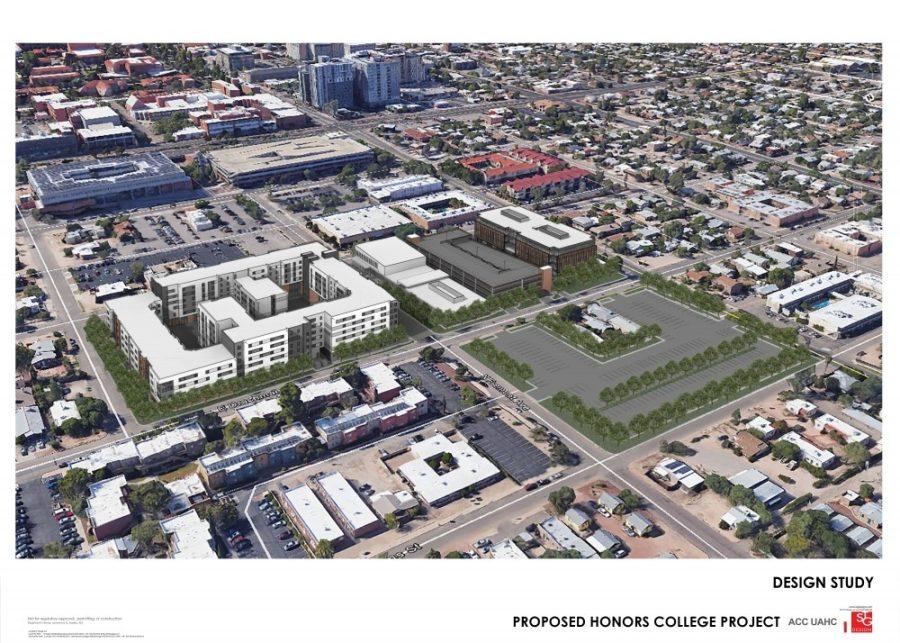Last year, a group of my friends and I were surprised to learn about the proposed honors college village because it seemed to come out of nowhere.
Once we found out, we wanted more information, which upon further exploration, seemed nearly non-existent.
The lack of information leaves us concerned. What is happening with this project?
No matter what the answer ends up being, the Honors College should display details about the project in plain sight. From the beginning, the Honors College has been too secretive regarding developments with the new complex.
Almost every time we have a conversation about this topic, there is at least one person listening in who has not heard about the project at all. At first, I ask “how?,” though I realize it’s hard to find any information, especially from the Honors College itself.
Some students may have been able to piece news together about the honors complex from the information online, but as for me, I’m not that clever.
First, we were emailed two surveys, one in December asking about personal experiences in the residence halls, then one in January asking about our vision for the Honors College. Originally, I thought the surveys were about quality control. I had no idea from the emails there were bigger plans.
Second, honors students received an invitation for a program advertised as something like “Meet Dr. Cheu.” I attended this event and remember eating pizza, listening to a quick story about the interim dean’s life and talking about our vision for the Honors College. I had to leave the event early, but again, I never would have guessed an idea for a proposed Honors College village would come out of it.
RELATED: City Council looks to have greater involvement in honors complex development
However, I was told three months later this meeting was one of the only opportunities for honors students to have input in the honors complex. If it were advertised as such in December, I think the turnout would have been much better.
I’ve looked in other places for information from the college. I did find some on the website, though I’m unsure how to access it without going to the search bar and typing in something like “new honors college.” This likely wouldn’t have made any more students aware of the plans. A student would have to be looking for this information in order to find it. Also, I never recall seeing any information on display during my numerous trips to Slonaker House.
Most of us learned about the complex not through the college but through articles published in the Daily Wildcat. It would’ve been better if the Honors College gave us the plan originally so we could feel more comfortable discussing issues with the college.
To grant the college the benefit of the doubt, lack of knowledge on this topic last year may have come from the fact that much of the planning occurred during second semester. By this point, many students are not as responsive to emails or participating in information sessions.
However, it seems like the college had an ideal opportunity to tell new freshmen about this project during their honors orientation. I asked freshmen residents in Yuma Hall about the topic, and all of them had either never heard about it or “may have read about it somewhere.”
RELATED: Campus Guide ’17: Honors College envisions future potential
Because a lot of students are already familiar with the project, the silence from the college gives some students uneasiness. We can only guess why the college does not openly discuss this topic.
Maybe it’s not going well? Are they worried about a backlash from students? Is the idea scrapped altogether? Students are interested to know.
According to the Honors College values, we should have responsibility for our communities. Allowing students to participate in discussing the project will allow them to take part in implementing their ideal Honors College. The Honors College is small enough to foster a good connection with its students. Bringing the honors college village into the open is a good first step.
The honors complex had been under a lot of pressure last year from the community, lawmakers, faculty and some students. I don’t think it would have made proceedings perfect, but keeping honors students involved in the process would have probably made the project run more smoothly. Organizing times to really talk with students would have slowed the process. Countering objections to the project would have kept it from moving through too quickly. Student input could have made the plans even better, and closer to what students are interested in. There wouldn’t be objections to the lack of transparency.
Despite the problems so far, it’s not too late to change the way this project is being handled. By becoming more transparent, the Honors College can dissipate rumors, confusion and uneasiness. Openly discussing the project will benefit students and the college.
Follow Toni Marcheva on Twitter









